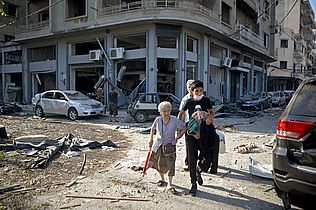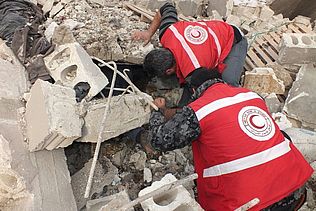The predictable and evitable breakdown of Zimbabwe’s public health care system is currently culminating in the cholera epidemic. Already back in 2006, local health organisations warned against the plague and asked the government to take preventive measures. These warnings went unheard, with the country’s elite already caring more about the retention of power than the basic needs of the people. Now civil society representatives are demonstrating against a policy that fails to stop the epidemic and blames the hostile world “outside” while becoming responsible for the death of hundreds of people.
By Anne Jung
In mid-February 2009, the World Health Organisation (WHO) stated that almost 70,000 people in Zimbabwe were infected with cholera. 3,500 people are said to have already died as a result of the heavy body desiccation caused by this bacterial form of diarrhoea. According to WHO estimations, the number of infections may have doubled by the beginning of the wet season. These are modest estimations, however, as many of the infected people do not appear in the statistics: due to the closure of many hospitals, lots of people die at home – unnoticed by the outside world. Only little information is to be obtained from rural areas: communication networks operate poorly and many regions are inaccessible due to the lack of petrol. In addition, there is political restriction on reporting and the recently introduced accreditation fee of up to 22,000 € per year for journalists will certainly not improve the situation.
Reasons are manifold
Quite untypically, in the summer of 2008 cholera broke out during the dry season. The epidemic then spread rapidly and has now reached the neighbouring countries of Zambia, Mozambique, Botswana and South Africa. It was unleashed by the water shortage that was caused when the government shut off the public water supply in Harare and other cities without any prior warning. In 2006, Robert Mugabe’s governing party ZANU-PF (Zimbabwe African National Union) handed the well-functioning municipal water supply to national authorities in order to increase profits for the government. Ever since, the dilapidated water pipes have been maintained badly. Moreover, in many places the waste collection is out of service. As a result, the waste is polluting the water and rivers are breaking their banks. Accordingly, residents of populated cities are more affected than people in rural areas, as in some provinces there are still protected water wells with clean water to be found.
The country’s economic crisis is also weakening the people’s health situation: a famine is about to strike and already now undernutrition and malnutrition lead to a rising infant and maternal mortality. Only one per cent of HIV-infected persons and AIDS patients have access to medication and with condoms being a scarce commodity, the infection rate is rising. The immunodeficiency and malnutrition equally turn cholera into a deadly disease. Usually less than one percent of the affected people die of cholera – in Zimbabwe it is five percent. Owing to the high HIV and AIDS rates, the average life expectancy among young Zimbabwean adults has dropped by half, amounting to 34 years for men and 37 years for women – thus making it the lowest life expectancy of the world.
Almost all of the public hospitals have been closed, the electric supply is poor and above all, there is a lack of medication. Due to the hyper-inflation rate of more than 1 billion %, the state salaries have dropped to such a degree that it would even cost a monthly wage to travel to work. Consequently, neither staff nor patients manage to reach the few open hospitals.
In all probability, the situation will be coming to a head since hardly anything can be expected from the government; so far only educational campaigns have been announced. A survey by the Physicians for Human Rights draws the conclusion that the government has to be blamed substantially for the outbreak of cholera, due to the denial of assistance and the downplaying of the problem. Additionally, the government is exploiting the epidemic for political purposes. The former minister of information, Sikhanyiso Ndlovu, accused Britain, as the former colonial power, of having deliberately brought cholera to the country. In December 2008, the AFP news agency quoted him as saying: “Cholera is a calculated, racist attack on Zimbabwe by the unrepentant former colonial power, which has enlisted support from its American and Western allies so that they can invade the country.” African intellectuals have rejected this “attack on human intelligence” (www.pambazuka.org). Yet, it seems important to take a closer look at this enduring anti-Western reflex.
The privatisation of health care systems
Twenty years ago, Zimbabwe was still investing in the public health care system. The exemplary model for a participatory primary health care promised everybody healthy living conditions and medical care in case of illness.
Subsequently, structural adjustment programmes were introduced by the IMF and the World Bank, forcing president Robert Mugabe and the Zimbabwean government to drastic cuts in the social infrastructure, especially with regard to public health care. Until 1999, the costs for private health care rose by 150 %. The labour conditions deteriorated and well-trained personnel left the country. Most of these people were recruited by Britain, since the British health care system had a growing demand for cheap labour due to the government’s neoliberal privatisation strategies. Only 200 to 300 trained doctors were still left in Zimbabwe by the midyear of 2008.
In the 1980s, the country’s health care system was considered exemplary; 85 % of the people had access to medical care in close proximity. The brain drain of Zimbabwe and other African countries brought about a deterioration of medical care. When the Zimbabwean government stopped investments in the health sector at the beginning of the 1990s, the public health care system collapsed. Health care prices are now exorbitantly high: already a simple medical treatment costs about half the average annual salary. As a result, only a privileged rich minority has access to health care.
Along with Zimbabwe’s withering right to health care, there is an ever growing success of self-proclaimed healers and religious preachers – among them Evangelical churches – squeezing money out of the desperate people. The “faith business” counts among the country’s few profitable branches.
The local health care movement
Health care organisations such as the Community Working Group on Health (CWGH) or the Zimbabwe Association of Doctors for Human Rights (ZADHR) call attention to the grievances that are officially being denied. This can be very risky. Repeatedly, demonstrations against the closure of hospitals and the lack of medication are forcibly dispersed. Nonetheless, basic health organisations are fighting the collapse of the health care system along with civil society – i.e. with doctors, nurses, trade unions, women’s movements, churches, tradesmen from the informal sector and human rights groups. Apart from protesting and appealing to the government, they are struggling to prevent the spreading of epidemics by means of health education and early stage treatment. As there are only few qualified medical staff in rural areas, many people simply do not know how to avoid and treat diseases. Local committees consisting of activists and trained personnel, as well as elected and traditional representatives of the communities, were founded in the countryside years ago. They cooperate closely with the local people. According to these committees, health care should not be a privilege for those few who can afford to go to the expensive private practices.
The outbreak of cholera could not be prevented. However, in some regions, over 400 health care workers managed to keep the epidemic from spreading any further. The local committees were supported by international NGOs.
The ambivalent role of NGOs
The gap caused by the government’s refusal to take social responsibility in Zimbabwe (as well as in other African countries) was often filled by both NGOs and supranational structures. Unfortunately, already existing structures are frequently ignored by the creation of parallel structures, thus paralysing the initiatives of the local communities. In an open letter, the CWGH therefore demanded cooperation with the communities, as regards emergency measures in the fight against cholera: “Zimbabweans are not numbers of cholera cases or fatalities. We are people who have responded to an increasingly difficult situation, who are entitled to health as a right and who should be central in any response and rehabilitation of our system.”
This should generally be taken into consideration in development cooperation. NGOs cannot replace a well-functioning health care system, neither as an interim measure nor permanently. Without resolving the political conflicts, the health care system cannot be rebuilt properly, neither in Zimbabwe nor in other countries.
Anne Jung works for the public relations and press office of medico international. medico is supporting the CWGH since 2007.
First published in D+C, 2009/03, Tribune, Page 118-119





